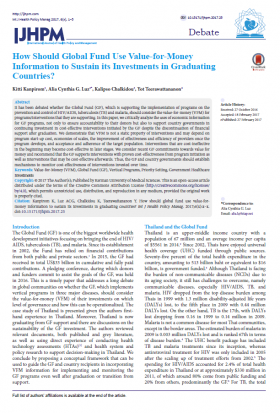This website uses cookies so that we can provide you with the best user experience possible. Cookie information is stored in your browser and performs functions such as recognising you when you return to our website and helping our team to understand which sections of the website you find most interesting and useful.
How Should Global Fund Use Value-for-Money Information to Sustain its Investments in Graduating Countries

รายละเอียดเพิ่มเติม
It has been debated whether the Global Fund (GF), which is supporting the implementation of programs on the prevention and control of HIV/AIDS, tuberculosis (TB) and malaria, should consider the value-for-money (VFM) for programs/interventions that they are supporting. In this paper, we critically analyze the uses of economic information for GF programs, not only to ensure accountability to their donors but also to support country governments in continuing investment in cost-effective interventions initiated by the GF despite the discontinuation of financial support after graduation. We demonstrate that VFM is not a static property of interventions and may depend on program start-up cost, economies of scales, the improvement of effectiveness and efficiency of providers once the program develops, and acceptance and adherence of the target population. Interventions that are cost-ineffective in the beginning may become cost-effective in later stages. We consider recent GF commitments towards value for money and recommend that the GF supports interventions with proven cost-effectiveness from program initiation as well as interventions that may be cost-effective afterwards. Thus, the GF and country governments should establish mechanisms to monitor cost-effectiveness of interventions invested over time.
Full Text: http://ijhpm.com/article_3330.html




